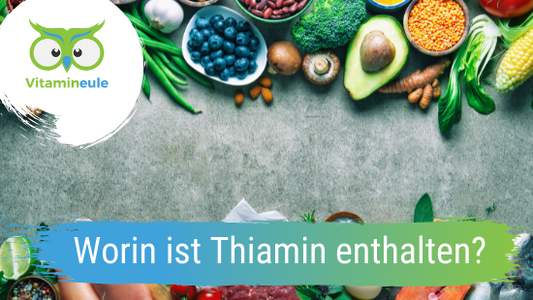Health Blog

The role of vitamin B1 in nerve health and stre...
Vitamin B1, also known as thiamine, plays a crucial role in nerve health and managing stress. It is one of the eight B vitamins that together play an important role...
The role of vitamin B1 in nerve health and stre...
Vitamin B1, also known as thiamine, plays a crucial role in nerve health and managing stress. It is one of the eight B vitamins that together play an important role...

Is vitamin B1 good for the heart and kidneys?
Vitamin B1, also known as thiamine, is an essential vitamin needed for the metabolism of carbohydrates, proteins and fats. It also plays an important role in maintaining healthy nervous system...
Is vitamin B1 good for the heart and kidneys?
Vitamin B1, also known as thiamine, is an essential vitamin needed for the metabolism of carbohydrates, proteins and fats. It also plays an important role in maintaining healthy nervous system...

Responsibilities of vitamin B1
The German Nutrition Society (DGE) recommends a daily dose of 1-1.3 mg of vitamin B1 for adults. Women in pregnancy are recommended a daily amount of 1.2 mg vitamin B1.
Responsibilities of vitamin B1
The German Nutrition Society (DGE) recommends a daily dose of 1-1.3 mg of vitamin B1 for adults. Women in pregnancy are recommended a daily amount of 1.2 mg vitamin B1.

What does thiamine contain?
Thiamine is found in both plant and animal products. Foods such as fish, pork, muscle meat, oatmeal and wheat germ contain particularly large amounts of vitamin B1. Peas, peanuts and...
What does thiamine contain?
Thiamine is found in both plant and animal products. Foods such as fish, pork, muscle meat, oatmeal and wheat germ contain particularly large amounts of vitamin B1. Peas, peanuts and...

Thiamine - daily requirement, occurrence and do...
Vitamin B1 is an essential vitamin. It is also known as thiamine. The organism needs the vitamin to metabolize nutrients and convert them into energy. The vitamin acts as a...
Thiamine - daily requirement, occurrence and do...
Vitamin B1 is an essential vitamin. It is also known as thiamine. The organism needs the vitamin to metabolize nutrients and convert them into energy. The vitamin acts as a...

What are the side effects of thiamin / vitamin B1?
Taking vitamin B1 in the form of food supplements does not cause any side effects. It is not possible to get an excess of vitamin B1 through food. If too...
What are the side effects of thiamin / vitamin B1?
Taking vitamin B1 in the form of food supplements does not cause any side effects. It is not possible to get an excess of vitamin B1 through food. If too...
disclaimer
The content of this health blog is for informational purposes only. It does not constitute medical advice and should not be interpreted as such. The texts published here are based on current research and findings in the field of dietary supplements and general health topics. However, they are in no way intended to replace professional medical diagnosis, treatment or advice.
We would like to expressly point out that the statements and recommendations shared in our blog have no direct connection to the products offered in our online shop. The effectiveness, safety and suitability of the active ingredients mentioned in the blog can vary individually and are not confirmed or guaranteed by our content.
The authors, publishers and operating company of this blog and our online shop accept no liability for any inconvenience or damage that may result from the use of the information provided. We strongly advise you to seek professional medical advice before using any dietary supplements or implementing specific health recommendations.
No responsibility is assumed for the topicality, correctness, completeness or quality of the information. Any claims against authors or operators due to damages resulting from the use or non-use of the information provided or from the use of incorrect or incomplete information are hereby excluded.
The products and services offered in the online shop are subject exclusively to the product descriptions and general terms and conditions provided there.
By using our blog, you accept this disclaimer and confirm your understanding that the content provided does not constitute purchase advice and does not establish a contractual relationship between you and the operating company or the authors of the blog.
